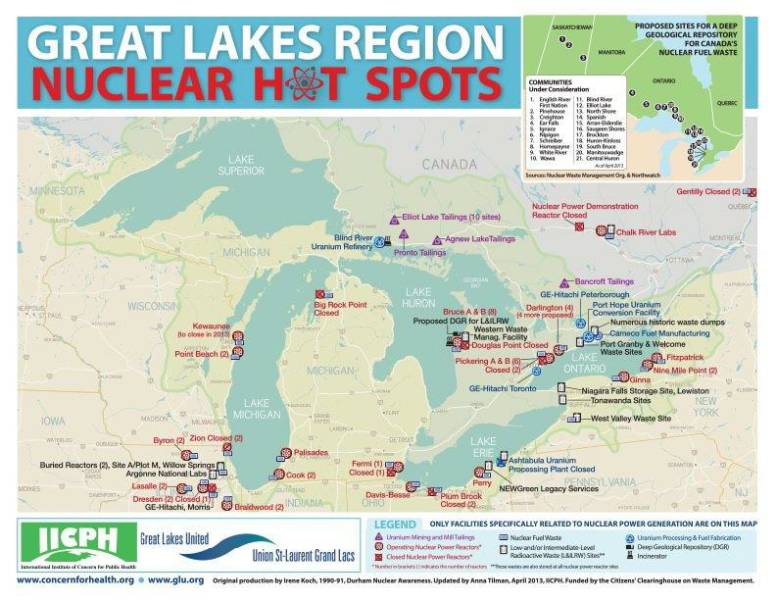Palisades
The Monster on the Beach
PALISADES SHOULD NOT BE REOPENED! There were good reasons why it was shut down, mainly the repairs needed were too costly so it was dumped and sold to HOLTEC for decommissioning. Holtec received millions of dollars to study reopening and then stated it couldn't yet has not decommissioned the nuclear plant as it signed on for. DEMAND that Palisades be safely decommissioned and never reopened. DEMAND that the site not be used for experimental replacement nuclear reactors, SMR's. The Great Lakes and people should not be put at risk and have their hard earned money used by nuclear power. In the end, liability falls on the public because of the PRICE ANDERSON ACT. No one could handle the damages that nuclear waste and spills can create to the long term contamination of the region.
Tritium contamination is a continual issue. It is not going away, and the Palisades site needs to be cleaned up to stop tritium from forever contaminating the Great Lakes.
UPDATED: NRC: 'Very slightly radioactive water' enters Lake MichiganBy Staff reportsThe Associated PressPosted May 06, 2013 @ 02:15 PMLast update May 06, 2013 @ 03:12 PMSeventy-nine gallons of "very slightly radioactive water" from a leaky tank at thetroubled Palisades Nuclear Power Plant spilled into Lake Michigan, a Nuclear Regulatory Commissionspokeswoman said today.There is no risk to human health because the radioactive material was further diluted when it entered astorage basin before flowing into the lake, NRC spokeswoman Viktoria Mitlyng said. She said there is"absolutely" no risk to human health.The plant is 80 miles east-northeast of Chicago in Van Buren County's Covert Township. It's beenunder heightened Nuclear Regulatory Commission attention because of a series of breakdown over twoyears.The southwestern Michigan plant was shut down Sunday after officials discovered a growing leak theday before in a water storage tank.Safety investigators reported Monday that 79 gallons from the 250,000-gallon tank into a basin holdingthousands of gallons of non-radioactive water, Mitlyng said. She said that water from the tank is nolonger reaching the lake.Mitlyng said the NRC is sending a metallurgy expert to the plant to inspect the leaky tank once it is fullydrained and pinpoint the source of the leak.The same tank sprang a leak in 2012, and some of the water caused water seepage into the plant'scontrol room. Afterward, the NRC set a cap on how much water could leak each day, and the tankexceeded that limit, Mitling said.Palisades is owned by New Orleans-based Entergy Corp. It has been shut down nine times sinceSeptember 2011, including in February for a different water leakage problem.
News from Beyond NuclearFor Immediate Release, May 6, 2013Contact: Kevin Kamps, Radioactive Waste Specialist, Beyond Nuclear, (240) 4623216Media Statement by Kevin Kamps, Beyond Nuclear, re: human health andsafety risks from latest leak at Palisades and spill of 79 gallons of radioactivewater into Lake Michigan“Entergy and U.S. Nuclear Regulatory Commission (NRC) spokespersons’ statementsthat the spill of 79 gallons of radioactive water into Lake Michigan signifies no threatto human health or safety should be taken with a big grain of salt.Claims of ‘very slightly radioactive’ are akin to ‘a little bit pregnant.’ In fact, the fetus in the mother’swomb is the single most vulnerable human life cycle stage to the hazards of radioactivity.The Safety Injection Refueling Water (SIRW) storage tank from which thisradioactive water leaked is used to flood the reactor cavity during refueling outages.While there, it picks up radioactive contamination, in the form of tritium, which isradioactive hydrogen, as well as other hazardous radioactive substances. It couldvery well also pick up radioactive hot particles, emitting significantly high radiationdoses. Any and all such contamination could have been in the 79 gallons ofradioactive water that spilled into Lake Michigan.Radioactive tritium is clinically proven to be a carcinogen, mutagen, and teratogen.That is, it can cause cancer, genetic damage, and birth defects.The U.S. National Academy of Science has reported for decades–most recently in 2005–that any exposure to radioactivity, no matter how small, carries a health riskfor cancer, and that such risks accumulate over a lifetime.Entergy and NRC cannot honestly say that radioactive contamination of theenvironment is ‘safe.’ What they really mean is they have decided, doing a‘costbenefit analysis,that such radioactive releases are ‘acceptably risky,’ in theiropinion. Of course, the benefit they worry about is Entergy’s profits. Thecost orriskthey find ‘acceptable’ includes someinevitablelevel of human health damage innearby communities.Health studies on just how bad this damage is often go undone,or are woefully inadequate.Entergy and NRC advocate that ‘dilution is the solution to radioactive pollution.’ ButLake Michigan is the drinking water supply for many millions of people. Palisadeshas been discharging tritium and other radioactive poisons–routinely with government permits, and accidentally as through leaks and spills–for 42 years. Countless communities draw their drinking and irrigation water from Lake Michigan–at closest range, South Haven. What this means is area and regionalresidents are being exposed to a constant, chronic level of exposure to tritium andother radioactive hazards, over long periods of time.Radioactive substances evenreconcentrate in the food chain and human bodies, thus undermining any claims of‘dilution is the solution.’Entergy and NRC should stop treating Lake Michigan as if it is a radioactiveindustrial sewer. It is the headwaters for 20% of the world’s surface fresh water, theGreat Lakes. The Great Lakes provide drinking water for 40 million people in eightU.S. states, two Canadian provinces, and a large number of Native American FirstNations.”
